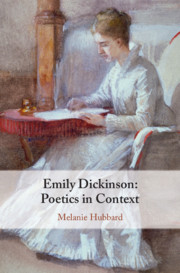
- Publisher:
- Cambridge University Press
- Online publication date:
- June 2020
- Print publication year:
- 2020
- Online ISBN:
- 9781108648752

This book re-assesses Dickinson's manuscripts, style, and statements to arrive at a historically appropriate conception of poetics. It compares her composition practices, such as variant generation and writing on already-marked scraps, with those of her peers in nineteenth-century American popular manuscript culture, tracing them to the pervasive influence of Scottish Common Sense philosophy, Hume's scepticism, and associationism in philosophy of mind and early neuroscience. The argument consults the archives and considers Dickinson's reading, in and out of school, in philosophy, rhetoric, and semiotic theory, as well as her training in inductive science and her familiarity with ideas about electricity, evolution, emotion, sympathy, and the brain. Combining close readings of poems with contextualizing information about contemporary conflicts in intellectual history, the book contends that Dickinson takes the making of poems to be her philosophical praxis. It depicts a Dickinson committed to thinking about the physical constitution of human consciousness and the historicity and materiality of one of its chief modes, language.
‘This slim volume is packed with energy and ideas … offers many clear and concise explanations to assist newcomers. This volume belongs on the shelf of any serious reader of Dickinson.’
J. W. Miller Source: Choice
 Loading metrics...
Loading metrics...
* Views captured on Cambridge Core between #date#. This data will be updated every 24 hours.
Usage data cannot currently be displayed.